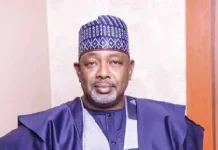By Philip Agbese
Not every Nigerian is gifted with the capacity to appreciate developments in their milieu. But certainly, there is tremendous improvements in the country’s domestic food production fortunes in the last few years, evident in the data of the overall contribution of the agricultural sector in the growth of Nigeria’s Gross Domestic Product (GDP).
The fixation not to recognize efforts of government has also blindfolded a few to the reality of FGN’s triumphs in food production, despite accidental hurdles in government’s efforts to ensure massive local food production and security; job creation; earning and conservation of scarce foreign reserves. However, any imagined misgivings do not displace the real progression.
When President Muhammadu Buhari became Nigeria’s democratic leader in 2015, he noticed an extremely recessed economy, mainly railroaded by the global drastic drop in the prices of crude oil in the international market. Mr. President loudly frowned at the trend amid daunting challenges of development. He preached diversification of the Nigerian economy as one of his immediate priorities through agriculture that champions the informal sector of our economy by stimulating farmers into massive local food production. It became the icing of the cake for Dr. Godwin Emefiele, the Governor of Central Bank of Nigeria.
Food security is a global slogan, and like the national anthem of every country. Each nation strives to be self-sustaining and self-sufficient on access to food. And Nigeria is a blessed country with arable and fertile land in all parts of the nation. Unfortunately, Nigeria’s agricultural resources have largely remained untapped or under-utilized in the past and the resort to importation of staple food commodities damagingly bruised the economy.
So, in the last few years, under the administration of President Buhari, appreciable efforts, energy and funds have been invested to boost agricultural production. Nigeria’s CBN Governor, Dr. Emefiele foresighted the danger far ahead having studied the unpromising indices of the economy and gave his whole heart to the task.
Emefiele sighted a bleak future with the clarity of Nostradamus, popularly referred to as “the man who saw tomorrow,” and knew, urgent steps had to be taken to avert an impending catastrophe in food availability. Therefore, Emefiele, Nigeria Nostradamus in disguise used the agric sector from to twice pull out the country recessions in quick succession.
The CBN has a pantheon of functions which are designed to breed a stable and prosperous economy for Nigeria. Emefiele saw Nigeria’s dark tomorrow and averted it by not only channeling energies on CBN’s price control, monetary, and financial system stability also by migrating full scale into a financial catalyst in the agricultural sector of the economy.
Today, Nigeria has met a significant percentage of its local agricultural production/consumption needs in several staple crops around the country. The CBN boss nay Nigeria has emerged victorious in spite of tough interruptions to farming enterprises and agric produce transportation, including the global Coronavirus pandemic (COVID-19) multiple lockdowns; the humongous degeneration of internal security; and natural disasters such as floods and fire outbreaks.
Often expectedly, Nigerians complain of rising costs of food items in the open market. But it takes only an impartial mind to understand the salient benefits. Those with this mindset hardly appreciates that it would have been worse had President Buhari from the onset failed to take aggressive steps in the revitalization of agriculture in the country.
There is abundant evidence that during the COVID-19 lockdown, the federal government palliatives of food supplies to all Nigerians were sourced locally from national food reserves. And unlike before, Nigeria has met 80% of its domestic rice consumption through local production; much like in other crops.
So far, the CBN has disbursed over N1.8 trillion intervention funds under the Agricultural Transformation Agenda (ATA), benefitted by different agricultural schemes as loans to stakeholders in a dozen value chains by December 31, 2020.
So, in spite of these unforeseen interruptions, Nigeria targeted its National Food Reserve (NFR) to reach 219, 900 metric tonnes by end of 2020. That limit has been exceeded. As early as 2016, as disclosed by the then Minister of Agriculture and Rural Development, Alhaji Mohammed Nanono, Nigeria had over 109,657 metric tonnes. Over the years, the nation has experienced an impressive progression in its agricultural funding and farmers engagements on a large scale.
Consequently, the Buhari Presidency has taken a bold step into agricultural revolution, through the CBN, which is still launching series of agricultural intervention schemes. But the Buhari Presidency’s focal action was the Anchor Borrower’s Programme (ABP), which he personally launched in Birnin-Kebbi, in Kebbi state.
Over the years, the ABP has commendably executed its mandate of providing farm inputs in kind and cash to Small Holder Farmers (SHFs) to boost production of specified commodities, stabilize inputs supply to agro- processors and correction of Nigeria’s negative balance of payments on food importation. SHFs harvests are supplied to the Agro-processor (Anchor) who in turn, pays the cash equivalent to the farmer’s account. The CBN initially disbursed over N300 billion to over 3.1 million SHFs in 21 different commodities, with a cumulative hectarage cultivation of over 3.8 million farmlands in areas like rice, wheat, maize, cotton, cassava, poultry, soybeans, groundnuts and fish among others.
By end of 2020, the CBN’s funded ABP’s rice farmers operating under the auspices of Rice Farmers’ Association of Nigeria (RIFAN) in five years, had a total of 2,923,937 farmers engaged in farming 3,647,643 hectares of 21 commodities, anchored by 23 Financial Institutions in all the 36 states and Abuja. Through these cumulative efforts, the yields, the agricultural sector has contributed to GDP rise to 22.35 percent in Q1’21, up from 19.79 percent in 2020 according to data from the National Bureau of Statistics (NBS).
And encouragingly, the agric sector alone impacted real economic growth on Nigeria by 2.2 percent in 2020, when the entire country recorded only 1.92 percent appreciation in growth.
On the continental food production map, Nigeria now ranks as the largest producer of rice in Africa, boasting of over 9 million metric tonnes. And on global ranking, Nigeria is the largest producer of cassava with 59.4 million metric tonnes and yam with 47.9 metric tonnes annually, while it has ranked 14th in maize production with 10.42 million metric tonnes; and 4th in palm oil with 7.7 million tonnes. Crops like Cassava, groundnuts, tomatoes, and sorghum; and the animal husbandry like Cattle beef, dairy and fish productions are recording yearly growth, consequently reducing Nigeria’s national agricultural import bill significantly, unlike previously, when it rather added pressure on FOREX.
The FGN’s initiatives on boasting domestic agricultural production are sustained in 2021. President Buhari has also approved the disbursement of N600 billion loan facility to 2.4 million farmers across the federation. Incumbent Minister of Agriculture and Rural Development, Dr .Mohammed Abubakar broke the cheering news at the commemoration of the 2021 World Food Day during the National Agricultural Show/Exhibition organized by the National Agricultural Foundation of Nigeria, NAFN, along Abuja-Keffi Expressway, Nasarawa State.
The N600 billion loan facility packaged through the Agro-Processing Productivity Enhancement and Livelihood Improvement Support project (APPEALS), is part of the relentless efforts and support to farmers for Nigeria’s food security.
Additionally, in July 2020, President Buhari launched the “Agriculture for Food and Job Plan (AFJP), a component of Nigeria Economic Sustainability Plan (NESP) targeted to cushion the negative impact of the COVID-19 pandemic on farmers. About five to 10 million jobs have been targeted to be created in the agricultural sector under this scheme and over 1. 138.000 million farmers have been assisted in the aftermath of the COVID-19 pandemic across the nation and the FCT.
The overall significance of CBN’s interventions in the agricultural sector these past five years under the Buhari Presidency is summed up by the Chairman, Senate Committee on Agriculture and Chairman, Board of Trustee of the National Agricultural Foundation of Nigeria, Sen. Abdullahi Adamu, in these frantic words; “As Chairman Senate Committee on Agriculture, and other Senators can confirm that the President has carved a niche for himself for formulating policies and programmes towards development and food security in the country.”
Therefore, through Dr. Godwin Emefiele’s focused, consistent and transparent management of intervention funds and schemes in the agricultural sector, President Buhari’s dream of diversifying Nigeria’s economy by revolutionizing domestic food production as an alternative to crude oil has greatly helped the economy of the country.
Some Nigerians may not grasp the benefits of today’s investment in the agric sector immediately. But without this foresight and the proactive steps, a Nigeria importing food during the Covid-19 lockdown would have been calamitous. Indeed, Emefiele is a man who saw tomorrow and averted imminent food crisis.
Agbese is a pro-Nigeria activist based in the United Kingdom.
Join Television Nigerian Whatsapp Now
Join Television Nigerian Facebook Now
Join Television Nigerian Twitter Now
Join Television Nigerian YouTUbe Now





